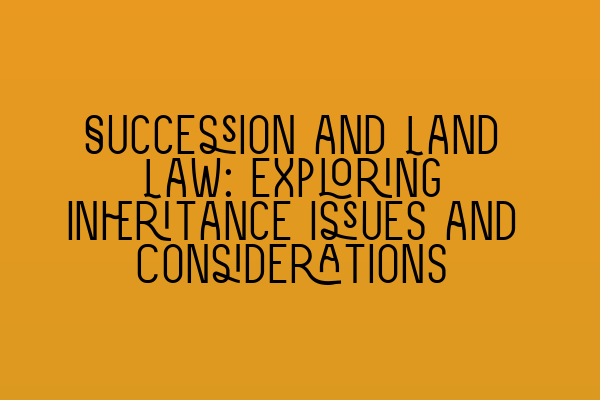Succession and Land Law: Exploring Inheritance Issues and Considerations
Inheritance matters can be complex, particularly when it comes to land and property. Succession and land law are intricately connected, with a range of legal considerations that must be taken into account. In this blog post, we will explore the key issues and considerations surrounding inheritance in relation to land law.
Understanding Succession and Land Law
Succession in land law refers to the transfer of real property from one owner to another upon the death of the original owner. It involves the legal process of distributing the property and assets of a deceased person (known as the “decedent”) to their heirs or beneficiaries.
When someone dies without leaving a valid will, their property and assets will be distributed in accordance with the intestacy rules. These rules prioritize certain family members in the distribution of the estate. Different jurisdictions may have different rules regarding intestacy, so it is essential to consult with a legal professional who specializes in land law to understand the specific requirements in your area.
Inheritance Tax
One crucial consideration in succession and land law is inheritance tax. Inheritance tax is a tax imposed on the value of the assets and property transferred upon death. The amount of inheritance tax payable depends on the total value of the estate and the relationship between the deceased and the beneficiary.
It is essential to seek professional advice to understand the applicable inheritance tax laws in your jurisdiction. Proper planning and structuring of your estate can help minimize the amount of inheritance tax that your beneficiaries will be required to pay.
Rights of Heirs and Beneficiaries
When it comes to succession and land law, the rights of heirs and beneficiaries depend on various factors, including the presence of a valid will, the specific provisions in the will, and the applicable laws in the jurisdiction.
If there is a valid will, the beneficiaries named in the will have the right to inherit the property as specified. However, it is essential to note that even if a will is in place, it can be contested if there are grounds to believe that it is not valid or that the deceased was unduly influenced or lacked the mental capacity to create a will.
In the absence of a valid will, the distribution of the estate will be governed by the intestacy rules. These rules typically prioritize close family members such as spouses, children, and parents. However, it is essential to be aware that these rules may not align with your personal preferences or intentions, making it even more crucial to have a valid will in place.
Implications for Property Owners
For property owners, understanding the implications of succession and land law is vital. Your property is likely to be one of your most valuable assets, and ensuring its proper transfer and management after your death is crucial.
It is advisable to consult with a property law specialist to discuss your options and determine the best strategy for your circumstances. They can help you create a legally valid will that clearly outlines your wishes regarding the distribution of your property and assets.
Additionally, if you are a property owner and have inherited property, it is essential to understand your rights and responsibilities. Depending on the specific circumstances, you may need to consider issues such as tenancy agreements, property maintenance, and tax obligations. Seeking advice from a property law expert will help ensure that you navigate these issues correctly.
Conclusion
Succession and land law are closely intertwined, with inheritance issues directly impacting the transfer and management of property. Understanding the legal considerations and implications in this area is essential for property owners and potential beneficiaries alike.
Consulting with a legal professional who specializes in property law and succession can provide you with expert guidance and ensure that your wishes are properly documented and executed. By having a valid will in place and understanding the applicable laws and tax implications, you can help safeguard your assets and provide peace of mind for your loved ones.
Related Articles:
